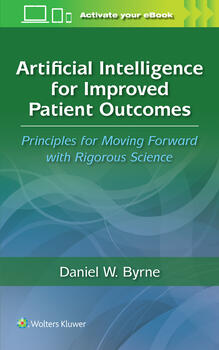(This post contains affiliate links.)
Although it may seem as though the widespread use of artificial intelligence (AI) is a new concept that has just made its appearance upon the world stage, this moment has actually been years in the making. To look a little more in depth at the use of AI in medicine–a topic near and dear to my heart, of course–I turned to Daniel W. Byrne, MS, Director of Artificial Intelligence Research at the Advanced Vanderbilt Artificial Intelligence Laboratory (AVAIL) in the Department of Biostatistics at Vanderbilt University Medical Center. Dan’s new book is called Artificial Intelligence for Improved Patient Outcomes: Principles for Moving Forward with Rigorous Science.

Dan was my instructor in medical writing and biostatistics when I did my course work for my MSCI (Master of Science in Clinical Investigation) degree at Vanderbilt many years ago, and I still feel quite fortunate to have had him as a mentor. Having read his new book myself, I can tell you that it is essential to understanding the promise of AI in medicine today and for the future.
Below are Dan’s answers to some of my questions about AI as well as one about medical writing in general.
When did you first become interested in AI, and why?
Since I began my career 40 years ago, I have been interested in AI and predictive models. At the beginning we developed models to optimize elderly patients for surgery. This was a game changer because at the time, surgeons thought it was too risky to operate on people over the age of 65.
Then when IBM used Watson to beat Jeopardy champions, I knew that AI had reached a new level of sophistication. I also realized that for AI to succeed in healthcare, someone with my experience in building and evaluating predictive models in medicine was essential for success.
Why has AI gotten such a bad reputation? Why is there so much resistance to it?
The field suffered from AI enthusiasts skipping rigorous pragmatic randomized controlled trials and jumping to aggressive marketing. Healthcare has always been resistant to change, partly due to misaligned incentives.
Were there any surprises in your research for this book? Anything you learned about AI that you weren’t expecting?
The biggest surprise in my research was that there is almost no evidence that AI improves patient outcomes and yet 99.9% of the population is easily convinced by flawed claims. Few people have the skills to evaluate the evidence of whether AI is improving health outcomes. This is one of the reasons that I wrote this book – to teach these skills.
What do you think is the greatest promise for the use of AI in medicine?
Predicting and preventing hospitalized complications is the low-hanging fruit. Predicting diseases and conditions earlier when they are more treatable will also be valuable.
Do you have any advice for medical writers in general, especially those undertaking a book project?
Think carefully about the topic for your book and make sure that it will fill a niche that will benefit your career. Then work on it consistently every day until it is excellent.
You may also be interested in reading:
Want to learn more about heart health and what you can do to live a happier, healthier life? Sign up for my newsletter!

